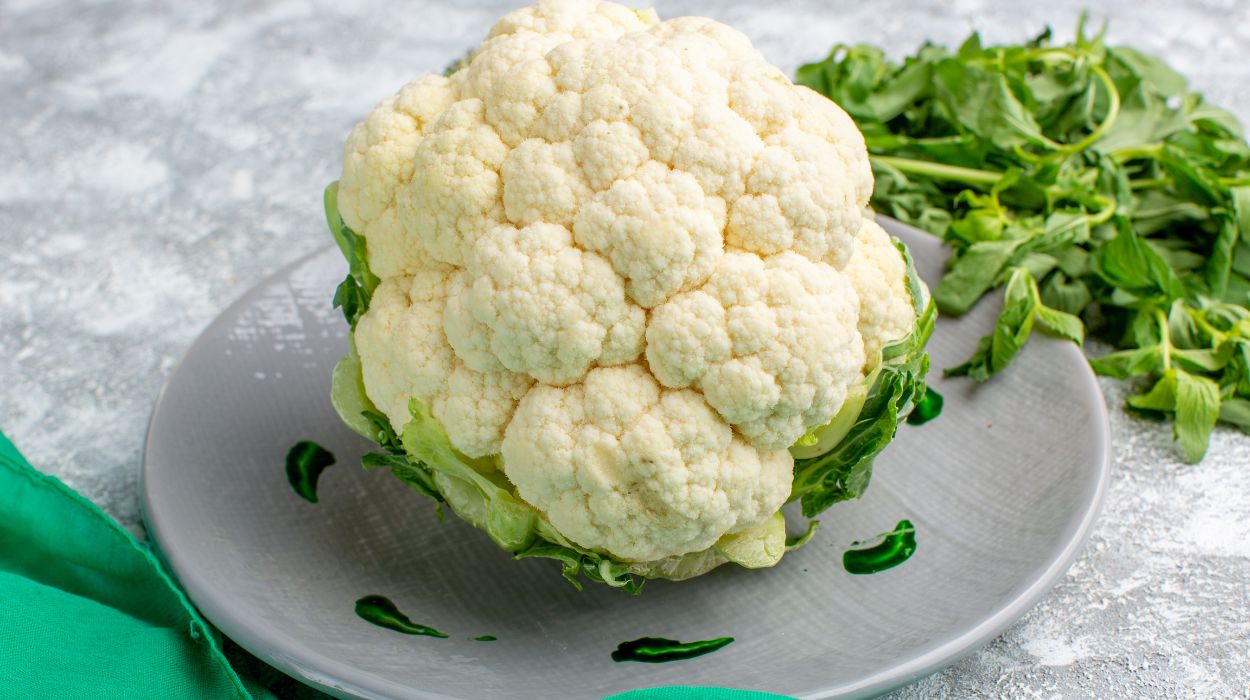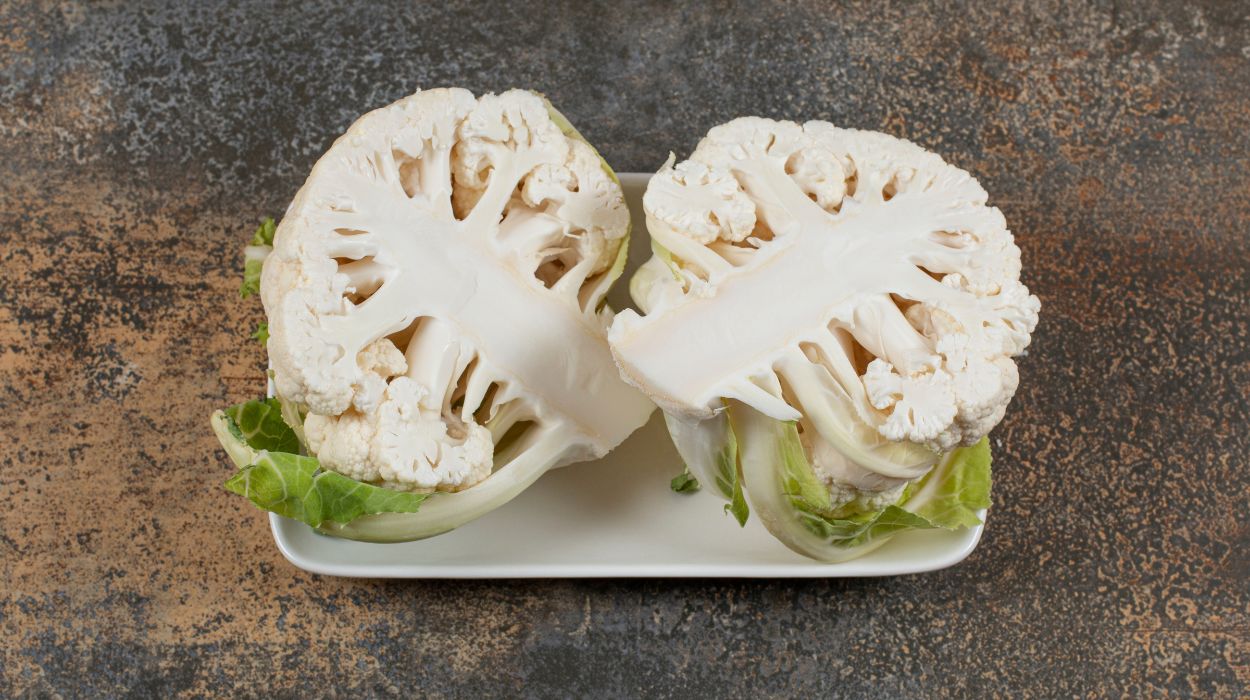 Evidence Based
Evidence Based
Evidence Based
This article is objectively based on relevant scientific literature, written by experienced medical writers, and fact-checked by a team of degreed medical experts.
Our team of registered dietitian nutritionists and licensed medical professionals seek to remain objective and unbiased while preserving the integrity of any scientific debate.
The articles contain evidence-based references from approved scientific sites. The numbers* in parentheses (*1,2,3) will take you to clickable links to our reputable sources.
Is Cauliflower Good For You? Great Benefits & Potential Risks 2024

Vegetables are a vital food group in the human diet. They provide protective nutrients that may help prevent disease in the body. Due to its versatility and low carbohydrate content, cauliflower has become very popular to include in low-carbohydrate diets.
Cauliflower, or Brassica oleracea L, is a cruciferous vegetable in the same family as broccoli, Brussels sprouts, arugula, and kale. Although it does not look very attractive, cauliflower can be transformed into a tasty part of your meal. The biggest question to answer here is why is cauliflower good for you.
Is Cauliflower Healthy?
Yes. Cauliflower is indeed healthy. It is packed with essential nutrients like vitamin C, vitamin K, and folate, as well as antioxidants such as beta-carotene and quercetin. These nutrients contribute to overall health by supporting the immune system, reducing inflammation, and promoting heart health. Additionally, cauliflower is low in calories and carbohydrates, making it a great option for those looking to manage their weight or blood sugar levels. Its high fiber content also aids in digestion and promotes satiety. Overall, the health benefits of cauliflower make it a valuable addition to any diet.
Is Cauliflower Good For You?
We can say all vegetables are good for you. Cauliflower can be another great addition to your diet. The Dietary Guidelines for Americans[1] recommend you consume 4 cups per week from the “Other Vegetables” group, which includes some cruciferous vegetables. Cauliflower contains nutrients and phytochemicals which may protect against cancer and other diseases.
Vegetables, including cauliflower, should be consumed daily. The Dietary Guidelines for Americans recommend 2 ½ cups per day of vegetables. It is better if you consume a variety of colors. Eating fruits and vegetables daily is your best bet for maintaining health.
The best thing about vegetables is that most of them have very few calories. They can fill up most of your plate to fill you up and help you avoid overeating. Vegetables, like cauliflower, can pair up easily with others to give you a variety of nutrients and fiber. These are an important part of a weight loss program, too.
Cauliflower Nutrition Facts

This vegetable is a great low-carb option to include daily. Don’t be fooled by cauliflower’s pale appearance. It is low in calories and packed with nutrients. Cruciferous vegetables like cauliflower can fill you up without affecting your weight.
One cup[2] of raw cauliflower provides
- Calories: 27
- Protein: 2 grams
- Fat: 0.3 grams
- Carbohydrates: 5 grams
- Fiber: 2 grams
- Magnesium: 16 milligrams (4% Daily Value)
- Potassium: 320 milligrams (7% DV)
- Vitamin C: 52 milligrams (60% DV)
- Folate: 61 micrograms (15% DV)
The vitamins that cauliflower contains can help with maintaining your immune system healthy, help produce red blood cells and protect from free radicals. It also contains magnesium, which keeps bones healthy, and potassium an important electrolyte in our bodies.
Cauliflower Benefits

There are many reasons[3] why eating cauliflower is good for you. Similar to other cruciferous vegetables, there are many health benefits when eaten most days of the week.
Cancer Protection
Cruciferous vegetables are a source of glucosinolate,[4] which is responsible for the sulfur-like flavor and aroma. After digestion, these compounds are broken down to indole-3-carbinol, which has been found to inhibit the development of cancer[5] in animal studies. There is still some more research needed to confirm this benefit in humans.
In addition to glucosinolate, cauliflower contains isothiocyanate[6] and carotenes. These other compounds have been studied for their similar inhibition of cancer cells and antioxidant and anti-inflammatory activity in the body.
Anti-Inflammatory
Cauliflower is a good source of vitamin C, an antioxidant.[7] Along with its content of carotenes, like beta-carotene, cauliflower can protect cells in the body from harmful free radicals, which result from normal metabolism. This means it counters inflammatory processes which could help prevent heart disease caused by these radicals.
The vitamin C in cauliflower plays a role in disease prevention and maintaining a healthy immune system. Cruciferous vegetables may be just what you need to support immune health in the human body.
Glucosinolate and isothiocyanate from Brassica vegetables[8] also have anti-inflammatory effects on women with endometriosis. This could not only improve symptoms of pain but also improve fertility.
Gastrointestinal Health
Cauliflower is a good source of fiber.[9] Meeting your daily fiber target between 25-38 g may help keep your bowels regular. Dietary fiber can help you maintain gut health by maintaining healthy bacteria. Having healthy bacteria in your gut has been associated with protection from inflammation and obesity.
Fiber is not only useful for weight loss by assisting in satiety, but it can also help prevent chronic diseases. Dietary fiber can help with glucose control and pain lipid (cholesterol) management, which could result in better glucose levels for people with diabetes and prevent cardiovascular disease.
Potential Side Effects
It is recommended that people eat vegetables daily, although some individuals may need to restrict or consume vegetables slightly differently due to medical reasons.
In particular, cauliflower may increase gas production, which could be uncomfortable for people with gastrointestinal diseases or an ostomy bag. Eating high-fiber foods may not be of benefit to people with actively inflamed bowels. Eating cauliflower may need to be monitored in people with inflammatory bowel disease (IBD, i.e., Crohn’s disease and ulcerative colitis) or irritable bowel syndrome (IBS).
When the intestines are normal, one may eat high-fiber foods, including cauliflower. Consuming foods high in fiber can help prevent the exacerbation of gastrointestinal diseases. Always discuss with your Registered Dietitian and medical provider when you may benefit from more fiber in your diet.
Cauliflower is a source of vitamin K, which affects blood coagulation. If a person is taking blood-thinning medication like warfarin therapy, they need to maintain a regular consumption of vitamin K-rich foods. Increasing or decreasing the consumption of cauliflower may affect blood clotting. It is important to discuss any changes in dietary consumption of vitamin K with your medical provider.
6 Ways To Add Cauliflower To Your Diet
Cauliflower can be a versatile vegetable. It can be eaten raw or cooked to process into different shapes. It also easily takes on the flavoring from many seasonings. Use herbs and spices to add flavor and variety to your vegetables. Although it is advised you stick to less processed options, you can purchase cauliflower fresh, frozen, or processed.
Eaten Raw
You can eat cauliflower uncooked. Chop up the florets of a cauliflower head. Include them in your salads for a nice crunch, dip them in your favorite low-fat dressing, or munch on them as a snack.
Steam Or Boil
Although it can be boiled, it may make cauliflower bland and lose some nutrients. Try parboiling instead to maintain its consistency and retain vitamins, but boiling it will make it easier to mash and puree and also make it easier to chew.
Steaming your vegetables is another way to prepare them to maintain their integrity and high vitamin content.
Bake Or Roast
Roasting always brings out great food flavors. Baking it can also make it interesting. Include it in your bakes, or roast whole or filleted.
Soups Or Stews
Chop up some cauliflower florets to include in soups or stews. If you have picky eaters in the home, try chopping it up or purchasing riced cauliflower to sneak into your meals. You can even sneak it into pasta sauce for additional nutrients.
Stir-Fry
Pair with other vegetables like broccoli, carrots, and onions and pan-fry in a small amount of oil.
Riced Or Processed
Use cooked cauliflower to make faux mashed potatoes. Use a food processor for rice cauliflower and use it as a rice replacement in a stir-fry. Another fun way to try cauliflower is by using it as a pizza crust.
If you are short on time, you can purchase cauliflower tortillas, cauliflower pasta or pizza crust, cauliflower mash, fries, or riced cauliflower. Some of these can be gluten-free options and in low carbohydrates. These cauliflower products can make for a low-carb diet.
If you have picky eaters in the home, try purchasing riced vegetables, including cauliflower. The small shape can allow the sneaking of cauliflower into sauces, potatoes, omelets, pasta, and soups easily. Vegetables like cauliflower can be easily disguised into other foods, without altering the flavor. Want a double-whammy? Make a soup of cauliflower and broccoli.
Conclusion
Cauliflower is an incredibly versatile vegetable. Like other vegetables in the Brassica family, it has nutrients and phytochemicals that may lower the risk of cancer and inflammatory damage.
Amongst the benefits of cauliflower, it can support your heart, gut, and overall health.
Not only that, cauliflower can be paired up easily with other vegetables to pack more vitamins. Be sure to include many cruciferous vegetables in your daily diet to improve overall health. Discuss first with your medical team if you can include these foods safely for a particular health condition and how it’s best for you to eat them.
+ 9 sources
Health Canal avoids using tertiary references. We have strict sourcing guidelines and rely on peer-reviewed studies, academic researches from medical associations and institutions. To ensure the accuracy of articles in Health Canal, you can read more about the editorial process here
- USDA (2020). Dietary Guidelines for Americans 2020 -2025 Make Every Bite Count With the Dietary Guidelines. [online] Available at: https://www.dietaryguidelines.gov/sites/default/files/2021-03/Dietary_Guidelines_for_Americans-2020-2025.pdf.
- Usda.gov. (2022). FoodData Central. [online] Available at: https://fdc.nal.usda.gov/fdc-app.html#/food-details/169986/nutrients.
- Mohamed, H.I., Sajyan, T.K., Shaalan, R., Bejjani, R., Sassine, Y.N. and Basit, A. (2022). Plant-mediated copper nanoparticles for agri-ecosystem applications. Agri-Waste and Microbes for Production of Sustainable Nanomaterials, [online] pp.79–120. doi:10.1016/b978-0-12-823575-1.00025-1.
- National Cancer Institute. (2012). Cruciferous Vegetables and Cancer Prevention. [online] Available at: https://www.cancer.gov/about-cancer/causes-prevention/risk/diet/cruciferous-vegetables-fact-sheet.
- Wagner, A.E., Terschluesen, A.M. and Rimbach, G. (2013). Health Promoting Effects of Brassica-Derived Phytochemicals: From Chemopreventive and Anti-Inflammatory Activities to Epigenetic Regulation. Oxidative Medicine and Cellular Longevity, [online] 2013, pp.1–12. doi:10.1155/2013/964539.
- Figueiredo, S., Filho, S., Nogueira-Machado, J. and Caligiorne, R. (2013). The Anti-Oxidant Properties of Isothiocyanates: A Review. Recent Patents on Endocrine, Metabolic & Immune Drug Discovery, [online] 7(3), pp.213–225. doi:10.2174/18722148113079990011.
- Kapusta-Duch J;Kopeć A;Piatkowska E;Borczak B;Leszczyńska T (2012). The beneficial effects of Brassica vegetables on human health. Roczniki Panstwowego Zakladu Higieny, [online] 63(4). Available at: https://pubmed.ncbi.nlm.nih.gov/23631258/.
- García-Ibañez, P., Yepes-Molina, L., Ruiz-Alcaraz, A.J., Martínez-Esparza, M., Moreno, D.A., Carvajal, M. and García-Peñarrubia, P. (2020). Brassica Bioactives Could Ameliorate the Chronic Inflammatory Condition of Endometriosis. International Journal of Molecular Sciences, [online] 21(24), p.9397. doi:10.3390/ijms21249397.
- Barber, T.M., Kabisch, S., Pfeiffer, A.F.H. and Weickert, M.O. (2020). The Health Benefits of Dietary Fibre. Nutrients, [online] 12(10), p.3209. doi:10.3390/nu12103209.



